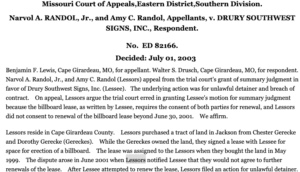 By Richard Rothfelder, Rothfelder and Falick
By Richard Rothfelder, Rothfelder and Falick
Make sure your billboard lease renewal clauses are consistent. Sometimes one clause in a lease can seem at odds with another. That’s the lesson of Randol v Drury Southwest Signs. Here are the facts.
- Chester and Dorothy Gereckes signed a lease with Drury Southwest for the erection of a billboard. Paragraph 7 of the lease said this: “Term Renewal 7 terms of 5 years each.” Paragraph 13 of the lease gave Drury the explicit and exclusive right to terminate the lease at any time over the potential 40 year life.
- Narvol and Amy Randol bought the land in 1999 and took an assignment of the lease from the Gereckes.
- In June 2001 the Randols notified Drury Southwest that they wouldn’t renew the lease and that the lease term ended June 30, 2001 and filed a court suit. The Randol’s attempted to argue that paragraph 7 of the lease required both parties to consent to lease extensions while paragraph 13 gave Drury the exclusive right to terminate the lease.
- A lower court and Court of Appeals found in favor of Drury. The court interpreted the two clauses to mean that only Drury had the right to approve extensions and in addition Drury had the right to terminate the lease at any time. The Court of Appeals said this in a footnote: “While no Missouri cases have specifically addressed the interpretation of a lease renewal covenant where the renewal provision does not indicate at whose option the lease may be reviewed, other jurisdictions have held that the right to renew is construed unilaterally in favor of the tenant/lessee.”
Rothfelder’s take: Drury ultimately prevailed but litigation could have been avoided had the lease renewal terms been explicit as to which party had the power to approve renewals. Silence may favor you but don’t count on it.
[wpforms id=”9787″]
Paid Advertisement

















